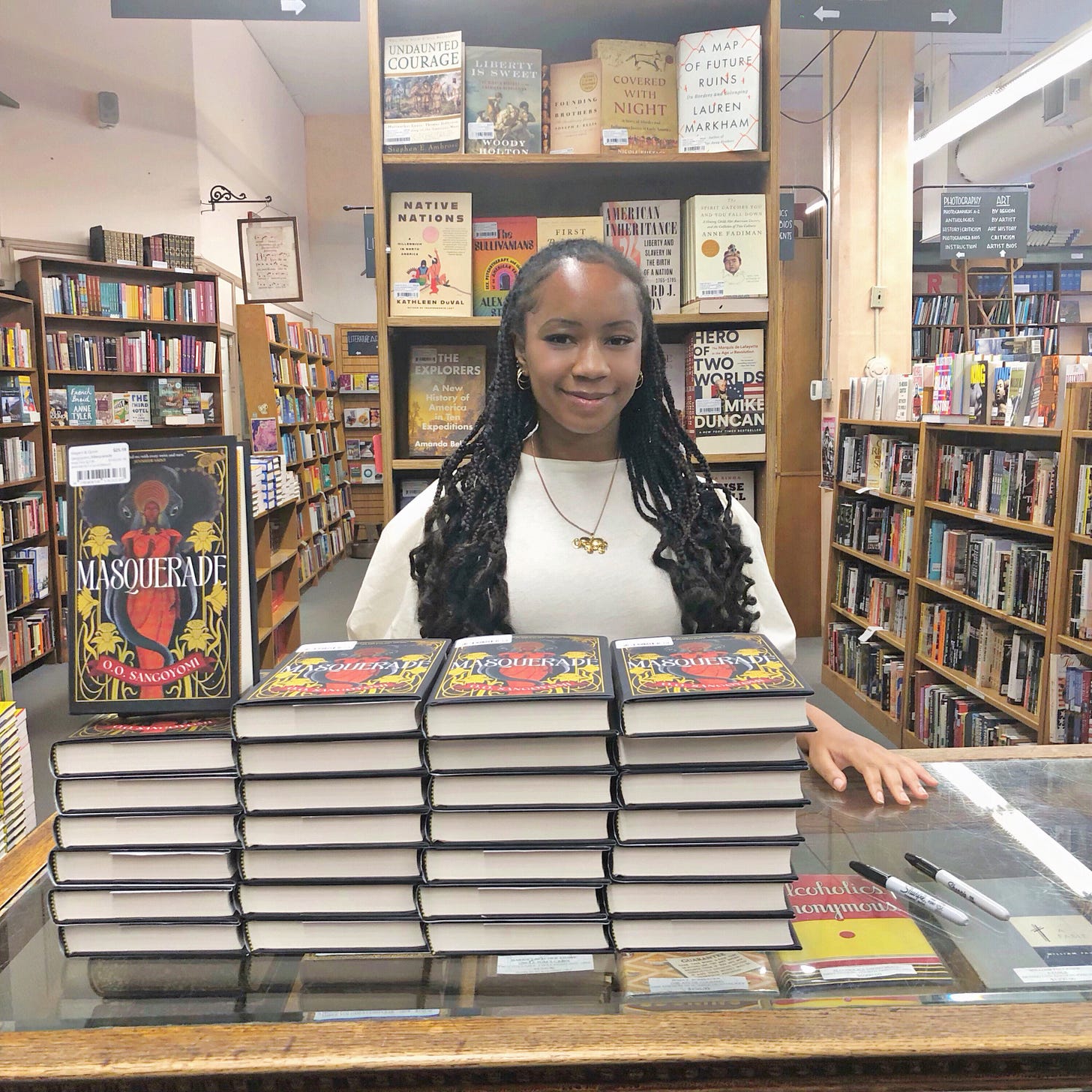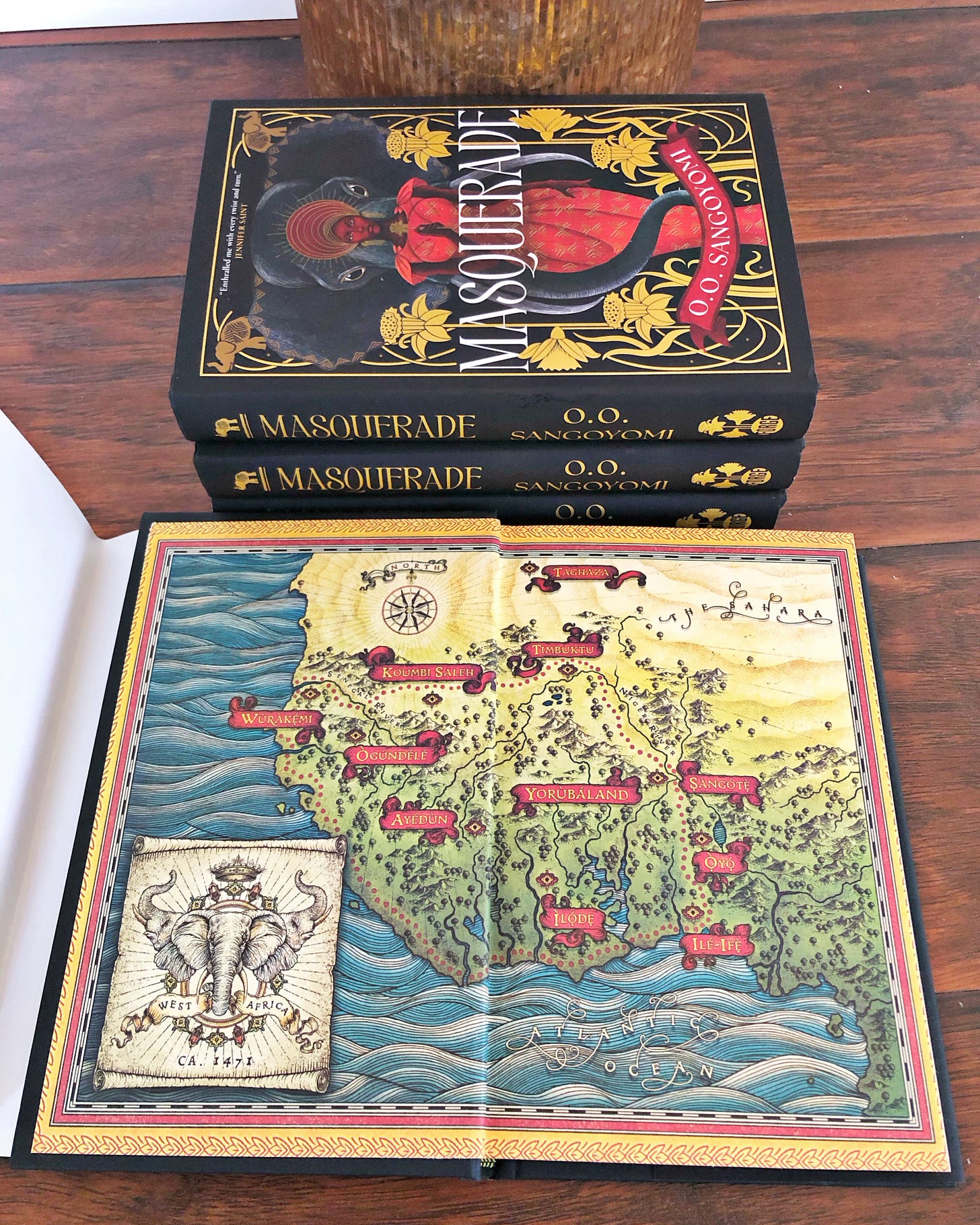MASQUERADE is historical fiction.
Reflecting on debut month and on the fictionalization of Africa
Happy New Year!
Yes, I am aware it is August. However, since my birthday is in August, this month technically marks the beginning of a new year for me. So the way I see it, I have still accomplished my resolution of starting a newsletter at the beginning of the year. Girl math ☺.
That is not the only new era I have stepped into. At the beginning of July, MASQUERADE was released in the U.S., Canada, and the U.K. I have officially been a published author for one month now. If you would like to support my debut novel, you can find purchase links here. There are other ways to show your support as well. You could request the book at your local library; leave a review on Amazon, Goodreads, or any other retailer; or share my Instagram and Twitter posts related to MASQUERADE. Any little bit helps.
Of course, there will be some of you who may have already supported MASQUERADE by attending one of the book’s events. Over the past few weeks, I have sat on a panel at the American Booksellers Association Annual Conference in San Diego, had a launch party for MASQUERADE, then subsequently embarked on a small book tour. According to the MBTI personality assessment, I am 86% an introvert (and an INTJ). So, as you can imagine, in-person events have never been an aspect of being an author that’s particularly enticing to me. Writing all day, every day, I love to do; researching niche topics for weeks on end, my favorite pastime. But talking to people? Meh.
However, I am glad I pushed myself out of my comfort zone to do these book events. I got to introduce MASQUERADE to many people, and it was a pleasure speaking with attendees who had already read or been acquainted with the novel. I plan to connect with even more readers later this year—but you’ll hear more on that in the next newsletter.
For now, I’d like to reflect on some of the conversations I had while on my book tour. One topic that commonly came up was the genre of MASQUERADE. It is squarely a historical fiction book, but it seems some readers have had trouble accepting it as such.
As I discussed at a few stops, this issue is undoubtedly tied to the rise of Afrofuturism and Afrofantasy. These genres have been a bit of a double-edged sword in publishing. On one hand, they have introduced new voices from different backgrounds to mainstream media. But on the other hand, they have also perpetuated the belief among Westerners—one that is subconscious or otherwise—that Africa does not exist outside of a fictional context.
It is unthinkable to reduce religions such as Christianity or Islam to a magic system in a novel. And yet Afrofantasy often depicts the òrìṣàs as magical beings despite the fact they are real deities of Ìṣẹ̀ṣe, a faith that is still practiced in parts of West Africa and Latin America to this day. Things like this have conditioned many readers to automatically associate African cultures with fantasy. It is to the extent where to them, these cultures are, not just unfamiliar, but entirely invented.
One result of this is that when some readers have come across the very normal Nigerian names featured in MASQUERADE, they have described them as being “too complicated” or “intimidating”. There has even been one suggestion that I should have “named Yorùbáland something else”—a comment I can only assume one feels comfortable making when they view these names, not as reality, but rather as though they are in the same category as names like “Gandalf” or “Hobbiton”.
All this has all the more validated my primary motivation for writing MASQUERADE, with that motivation being to highlight West Africa as the very real place it is and has always been. And I emphasize West Africa—and will even further specify that my novel focuses mainly on Yorùbáland—because to regard a work as representative of a general “African culture” further fuels the fictionalization of Africa. There is no such thing as “African culture”, not when Africa is the most diverse continent in the world, holding thousands of different ethnic groups. Every single one of these tribes have their own unique traditions, languages, and very, very long histories. So much is lost when all of these peoples are smoothed into one, and refusing to acknowledge them in any context save for a fantastical one only heightens that erasure.
And so, for those who plan on picking up MASQUERADE, just know there is a prerequisite for reading it. In order to read this novel, you must release any presumptions about works related to Africa you may not even know you have. That way, you will be able to acknowledge the historical story that is right in front of you, rather than projecting the fantasy that you think a book like this is supposed to be.
If you have made it this far into the newsletter, thanks. Let's end on a lighter note. Here’s a gift: the official playlist for MASQUERADE. I’ve organized the songs so that they align with Òdòdó’s arc in the novel: from being happily in love, to being manically in love, to just being manic. So for the best listening experience, I recommend playing the playlist in order, at least the first time through.
WHAT I’M READING
I will be concluding my newsletters by mentioning my current or most recent read. And currently, what I am reading is Sula by Toni Morrison. I am a broken record when it comes to Morrison, always citing her writings as having some of the largest impact on my own craft. But it really is true. And after Sula, I just need to read Love, and then I will have read every novel she wrote.
I have also been reading multiple scholarly papers and articles, as well as some literature, relating to Yorùbá hunters. It’s required reading, of sorts… Take that to mean what you will.






Thank you so much for sharing this! You articulated the muddled thoughts that have always felt a little scattered the last couple years very very well. I hope publishing and readers alike finally embrace that many things they see as mere mythology are very *real* beliefs
Wow!! This is really good and I appreciate your thoughts on Masquerade not to be classified as fantasy. It’s quite telling because none of the characters have any “powers” based off Orisa (other than children of blood & bone by Tomi Adeyemi for example). So why would they think to tag it as fantasy when its purely about Ododo navigating the court of Yoruba land. It also hurts that people made comments on the names being too complicated. That’s outrageous!! Our names have meaning and life ingrained in each syllable. It’s part of us and our story.
I also want to thank you for highlighting West Africa. It reminded me how the countries surrounding us today were one once. Even then, different parts practiced different things, including Nigeria today!! We’re so diverse and I love us 🥺
Thank you for writing this. I can’t wait to read more!! The playlist??? Yes please 🤭🤭